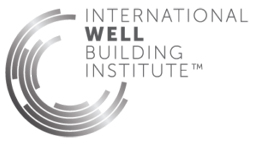WELL CERTIFICATION
The WELL Building Standard™ is an evidence-based system for measuring, certifying and monitoring the performance of building features that impact health and well-being.
The WELL Building Standard™ provides the opportunity to design and build with a human-centred approach, which ultimately supports the industry in comprehensively addressing human health: employers spend 90% of their annual operating costs on people. This means that even a small impact on productivity, engagement and satisfaction in the workplace can have huge returns on investment.
WELL is administered by the International WELL Building Institute™ (IWBI), a public benefit corporation whose mission is to improve human health and well-being through the built environment
The WELL Building Standard™ can be applied across many real estate sectors, and the current WELL v2 is optimized for commercial and institutional office buildings. WELL is further organized into Project Typologies which take into account the specific set of considerations that are unique to a particular building type or the phase of construction.
10 CONCEPTS


The WELL Features are categorized as either Precondition—necessary for baseline WELL Certification, or Optimizations—optional enhancements, which together determine the level of certification above baseline certification. The weighted scores are combined and the final score is translated into a rating of Silver, Gold or Platinum level certification.
WELL MAIN REFERENCES
[table id=2 /]
The WELL measures attributes of buildings that impact occupant health, the certification system is holistic, therefore, divided into specific thematic areas which constituted by “Features” measuring, monitoring and then certified building’s performances.
This protocol is a compendium of all the principles of the so-called “well-being” organisation which all companies should strive for and whose absence has complained in Europe on average of 6 out of 10 workers.




